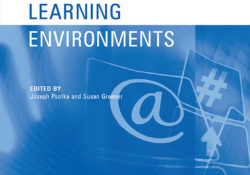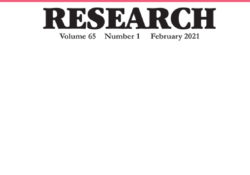tandfonline.com har udgivet en rapport under søgningen “Teacher Education Mathematics”: ABSTRACT ABSTRACT There is considerable debate and ambiguity around what constitutes “computational thinking” (CT). In contrast to Computer Science which is generally treated as a distinct field of study, CT as a construct highlights the integral relationship between computing and other fields. Many recent efforts seek to map computational thinking by making high-level connections to other school disciplines. We argue that while these efforts may help identify specific curricular areas in which computing is likely to take place, they do not sufficiently capture the specificity and dynamism that is characteristic of meaningful computational integration. Worse, they exclude generative examples of computing integration that exist outside of the traditional STEM context or researcher-led efforts. In this special issue, we offer a… Continue Reading →
Like this:
Like Loading...
eric.ed.gov har udgivet: Teachers increasingly use virtual manipulatives and other apps on touch-screen devices (e.g., “iPads”) in an effort to help students understand mathematics concepts. However, students experience these apps and their affordances in different ways. The purpose of this article is to inform teachers’ decisions about app implementation in the classroom through discussion of four case studies illustrating ways children interacted with the app “Motion Math: Zoom,” and how these interactions revealed, concealed, and developed children’s mathematical understanding. These results suggest that mathematics virtual manipulative apps on touch-screen devices can be useful tools when thoughtfully implemented. Teachers can balance technological distance by assisting students who need help as they learn the technology required to interact with the app. This may include explicitly using scaffolding provided by the app, leading… Continue Reading →
Like this:
Like Loading...
tandfonline.com har udgivet en rapport under søgningen “Teacher Education Mathematics”: Abstract Abstract The notion of historical thinking has in recent years become popular in research on history education, particularly so in North America, the UK and Australia. The aim of this paper is to discuss the cognitive competencies related to historical thinking, as expressed by some influential Canadian researchers, as an history educational notion from two aspects: what is historical thinking and what does it mean in an educational context, and what are the consequences of historical thinking for history education? Our discussion will focus on possible implications of this approach to history education regarding what should be taught in history classrooms and why. By focusing on the notion of historicity, we want to argue that while a focus on… Continue Reading →
Like this:
Like Loading...
tandfonline.com har udgivet en rapport under søgningen “Teacher Education Mathematics”: Link til kilde
Like this:
Like Loading...
tandfonline.com har udgivet en rapport under søgningen “Teacher Education Mathematics”: Abstract Abstract This is the introduction to the special edition on learning analytics. Link til kilde
Like this:
Like Loading...
eric.ed.gov har udgivet: Computational thinking is a way of thinking that covers 21st century skills and includes new generation concepts such as robotics, coding, informatics and information construction. Computational thinking has reached an important point especially in the field of science in line with the rapid developments in technology. Robotics applications, software-based activities, STEM (Science, Technology, Engineering, Math) education and problem-based studies are some of the areas where this thinking is used. In this study, which is based on this point, it is aimed to develop a scale for computational thinking. Exploratory sequential design, one of the mixed research methods, was used in the study. First of all, a detailed literature review was conducted and needs analysis was carried out. This study consists of two stages. In the first stage,… Continue Reading →
Like this:
Like Loading...
tandfonline.com har udgivet en rapport under søgningen “Teacher Education Mathematics”: Link til kilde
Like this:
Like Loading...
tandfonline.com har udgivet en rapport under søgningen “Teacher Education Mathematics”: ABSTRACT ABSTRACT Educationalists have had serious problems in proposing well-grounded ways of teaching critical thinking. Reviews of the field have called for research to develop theory concerning the learning experience associated with critical thinking enhancement, as well as to explore more tailored teaching and evaluation methods. This article suggests an approach to teaching critical thinking with potential to handle these concerns. Based on an analysis of students’ essay responses, the article carries out a thought experiment to elaborate an example of design and enactment of lessons using the variation theory of teaching and learning. In this way, the article offers the research community a thorough description of a theory-driven and tailored tool for teaching and evaluating critical thinking, which deserves… Continue Reading →
Like this:
Like Loading...
tandfonline.com har udgivet en rapport under søgningen “Teacher Education Mathematics”: ABSTRACT ABSTRACT What can educators working to develop critical thinking (CT) in their classrooms gain from engaging with the German/Scandinavian tradition of Bildung-centred Didaktik? This article takes up the challenge of how to develop an epistemology of CT that is relational and contextual and gives students the possibility of engaging in ethical debates about social justice, as called for by critical pedagogues such as Lim (2011, 2015). The backdrop is an increasing focus on CT as a prominent educational goal in the Organisation for Economic Co-operation and Development and beyond, a development that makes it important to clarify the epistemological basis for how CT can be developed in schools and the ethical foundations and implications of the different approaches in… Continue Reading →
Like this:
Like Loading...
eric.ed.gov har udgivet: A teacher that emphasizes reasoning, logic and validity gives their students access to mathematics as an effective way of practicing critical thinking. All students have the ability to enhance and expand their critical thinking when learning mathematics. Students can develop this ability when confronting mathematical problems, identifying possible solutions and evaluating and justifying their reasons for the results, thereby allowing students to become confident critical thinkers. Critical thinking and reasoning allows students to think about how they utilize their discipline of mathematical skills (i.e., they think about their method of thinking). Metacognition helps students to recognize that math is logical reasoning on solutions to problems. Students are taught how to: identify scenarios; evaluate; select problem-solving strategies; identify possible conclusions; select logical conclusions; describe how a solution was… Continue Reading →
Like this:
Like Loading...






